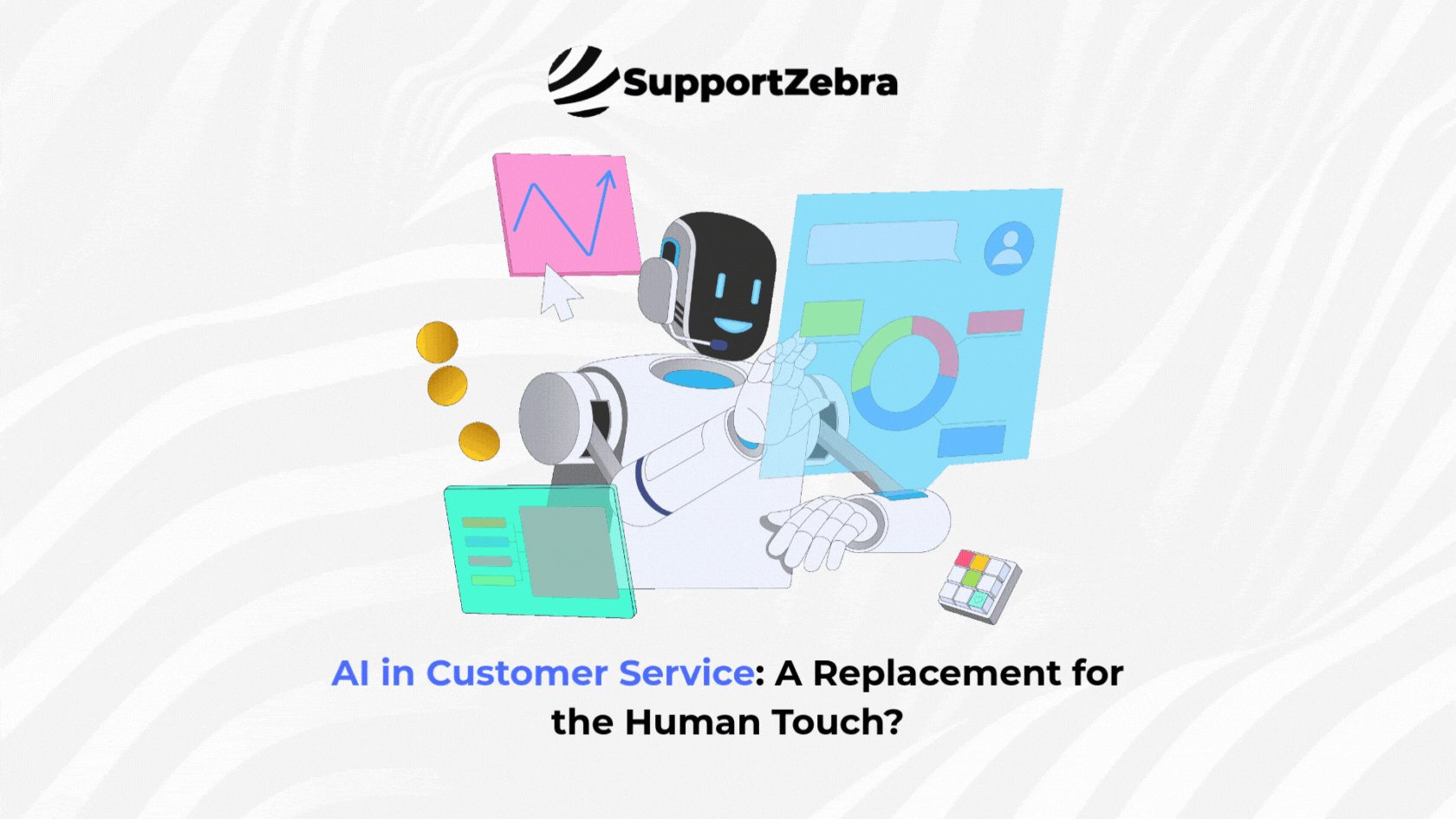Is AI the Future of Customer Service? The Truth Behind the Headlines
- AI enhances customer service with faster responses, personalized experiences, and cost-effective operations.
- While AI improves efficiency, it cannot fully replace the empathy and problem-solving skills of human agents.
- The future of customer service lies in balancing AI automation with the human touch for complex interactions.
- SupportZebra combines AI tools with expert agents to boost satisfaction, cut costs, and strengthen customer loyalty.
What happens when AI enters customer service? As companies adopt AI technologies, customer interactions are rapidly evolving. From chatbots providing quick responses to algorithms understanding preferences, AI is crucial for enhancing service efficiency and personalization. However, a key question arises: Can AI replace human interaction in customer service, or does it merely enhance the experience?
This blog will explore the balance between automation and human connection, examining whether AI truly represents the future of customer service.
Understanding AI in Customer Service
When it comes to integrating AI into customer service, it’s about using smart tools to enhance customer interactions and support. By automating simple tasks and providing quick responses, AI can work alongside your team to improve the efficiency and personalization of your service.
Here are some key AI technologies that can help elevate your customer service:
- Chatbots
These handy tools can answer customer questions and offer assistance 24/7, ensuring customers are never left waiting.
- Natural Language Processing (NLP)
NLP allows machines to understand and respond to human language, making communication between your customers and AI more natural and seamless.
- Machine Learning
Machine learning adapts to customer behavior over time, helping fine-tune responses and predict what your customers might need next.
By leveraging AI, you can optimize operations, reduce response times, handle multiple inquiries, and analyze data for customer insights. This enables human agents to focus on complex issues, boosting customer satisfaction and loyalty.
Benefits of AI in Customer Service
AI in customer service brings many benefits, changing how support teams communicate with you and delivering unique experiences through different digital and voice channels. Here’s what you can look forward to:
- Enhanced Efficiency
AI tools like Einstein Copilot boost service team productivity by 14%, with 84% of IT leaders agreeing that AI significantly enhances customer service.
- Boosted Productivity
AI streamlines workflows, reducing tedious manual tasks and increasing service speed by 63% by simplifying system navigation and information retrieval.
- Customized Service Experience
AI personalizes customer interactions by remembering names and preferences, ensuring each engagement feels tailored.
- Improved Operational Efficiency
AI predicts and enhances processes by analyzing interactions, identifying patterns, and updating knowledge articles for quick, accurate support.
- Better Agent Well-Being
By handling repetitive tasks, AI allows agents to focus on meaningful work, reducing burnout. 79% of IT leaders see generative AI as a valuable tool for easing workloads.
- Proactive Service Delivery
AI anticipates customer needs by sending reminders and creating content based on past interactions, keeping customers informed and engaged.
- Uninterrupted Service
AI ensures continuous customer service by reducing disruptions and automating tasks, resulting in faster response times and increased customer satisfaction.
- Cost-Effective Operations
AI significantly lowers customer service costs by handling simple inquiries, allowing fewer agents to address complex issues and better manage budgets.
- Enhanced Interactions
AI tools improve agent efficiency, leading to quicker interactions and reduced hold times, enhancing satisfaction for both agents and customers.
Limitations of AI in Customer Service
AI can improve your customer service, but it’s essential to understand its limitations to find the right mix of automation and personal interaction.
One major issue is that AI lacks the “human touch” that customers appreciate, especially in delicate situations. Relying too heavily on automated replies can annoy customers if their issues aren’t fully resolved, leading to frustration.
Another drawback is that AI struggles with complicated questions that need critical thinking. While it’s great for simple tasks, it can have difficulty dealing with complex problems, like sorting out billing issues with multiple transactions. In these scenarios, human agents are much better at providing personalized help.
By recognizing these limitations, you can use AI to assist your human agents, ensuring your customers receive quick answers and the caring, customized service they deserve.
The Future of Customer Service
The future of customer service is focused on teamwork between AI and human agents instead of AI completely taking over. By using AI, you can improve your service quality with valuable insights and automation. AI can take care of simple tasks, which lets your team concentrate on more complicated questions that need a personal touch.
New trends like generative AI, predictive analytics, and multimodal AI will change how customer service works. These technologies will allow you to automate replies, create tailored content, and handle customer interactions on various platforms. As these innovations progress, your customer service team must learn how to use AI tools to enhance the customer experience effectively.
The aim is not to replace your agents but to equip them with AI that increases efficiency and personalizes interactions, helping your business stay competitive.
Balancing AI and Human Touch with SupportZebra
At SupportZebra, we leverage AI to enhance customer service. Our dedicated development team focuses on AI projects, ensuring your operations stay current and deliver exceptional experiences while cutting costs. Our AI tools adapt to customer behavior, providing optimal responses for quick solutions and increased satisfaction.
Our technology equips agents with comprehensive customer information, including call histories, ratings, ticket statuses, and more, enabling informed decisions that enhance the customer experience. By utilizing AI, we improve customer retention and loyalty, establishing ourselves as leaders in the customer service sector.
Contact SupportZebra today to transform your operations with AI in customer service.

